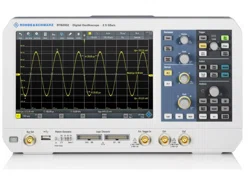Loading ...
Loading ...
Loading ...

Serial Bus Analysis
R&S
®
RTB2000
171User Manual 1333.1611.02 ─ 03
a) "<Protocol> Trigger" = "Identifier", or "Identifier + Data", or "Address", or
"Address and Data".
b) Tap "Symbolic ID".
c) Select the label. The list provides all symbolic names that are defined in the
loaded file.
4. Close the dialog.
5. Set the trigger mode to "Normal".
12.1.5.2 Content and Format of the PTT File
Label lists are stored as PTT (protocol translation table) files. The PTT file format is an
extension of the CSV format (comma-separated values). You can edit it with standard
editors, for example, with MS Excel or a text editor.
The PTT file has three types of lines:
●
Comment lines begin with a hash character #. A hash character at any other posi-
tion in the line is treated like a standard character.
●
Command lines begin with a commercial at character @. An @ character at any
other position in the line is treated like a standard character.
●
Standard lines are the lines that not qualify as comment or command lines. They
build the core of the label list.
Command lines
Command lines define the version of the PTT file and the protocol name:
●
@FILE_VERSION: must appear exactly once in the file
●
@PROTOCOL_NAME: must appear at least once in the file. Thus, one file can
contain several label lists for different protocols.
# --- Start of PTT file
@FILE_VERSION = 1.0
@PROTOCOL_NAME = i2c
[... Label list for I2C]
@PROTOCOL_NAME = can
[... Label list for CAN]
# --- End of PTT file
Standard lines
Standard lines define the contents of the label list. The rules for standard lines follow
the csv convention, they are:
●
Values are separated by commas
●
Space characters following a delimiter are ignored
●
Values with a special character (comma, newline, or double quote) must be
enclosed in double quotes
●
Text in double quotes must be escaped by double quote characters
Basics of Protocol Analysis
Loading ...
Loading ...
Loading ...
